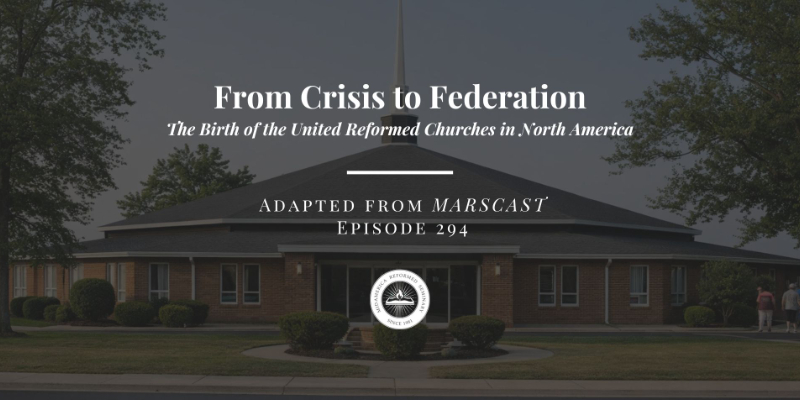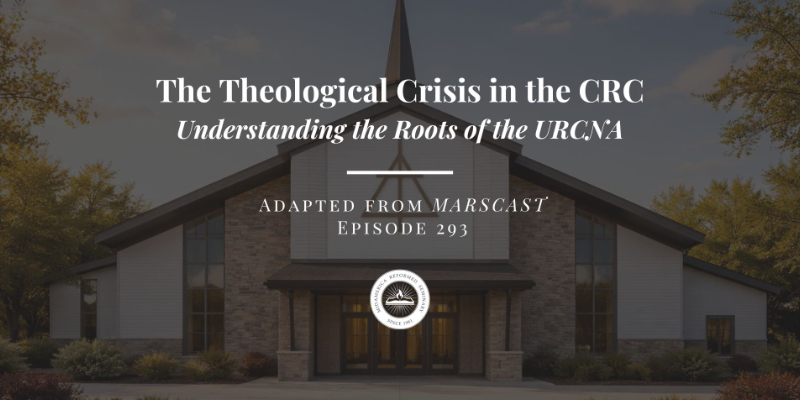
Revelation and Redemptive History: A Theological Case for Cessationism
In the ongoing conversation between cessationism and continuationism, many evangelicals today (especially in global and charismatic contexts) lean toward expecting and even seeking extraordinary spiritual gifts: prophecy, tongues, healing, and miracles. But what if the presence or absence of such gifts is not merely a matter of individual faith, spiritual hunger, or denominational tradition? What if the very structure of redemptive history and the nature of divine revelation point us to a different understanding of how God now speaks to and works within His church?
In Episode 129 of Mid-America’s faculty podcast (then called Round Table, now MARSCAST, and our fifth most-listened-to episode ever), Dr. Marcus Mininger and Dr. Cornelis Venema present a biblically grounded and historically informed case for cessationism, the view that certain spiritual gifts, particularly the miraculous and revelatory ones, ceased with the close of the apostolic era. What follows is a theological distillation and adaptation of that conversation, which is intended to provoke careful reflection and humble re-evaluation in light of Scripture’s redemptive contours.
Revelation as Redemptive-Historical Event, Not Perpetual Stream
The starting point for any doctrine of spiritual gifts must be an understanding of how God reveals Himself in history. Revelation in Scripture is not a constantly running faucet, nor is it given to every generation in equal measure or form. Rather, God’s self-disclosure in redemptive history follows a distinctive pattern: it is periodic and covenantally bound to acts of divine redemption.
We can observe distinct “epochs of silence” in the biblical narrative, periods in which no new word from God was delivered, no prophet spoke, and no vision was given. Consider, for example:
- The long stretch between Cain and Abel and the time of Noah.
- The silence from Noah to Abraham.
- The quiet centuries between Joseph and Moses.
- The four centuries of silence between Malachi and the birth announcements in Luke 1.
These gaps serve to highlight a crucial point: when God speaks, He speaks to interpret and accompany His redemptive actions. Revelation is never arbitrary or merely inspirational; it is tethered to what God is doing in redemptive history.
Thus, revelation clusters around redemptive events. God speaks to Noah because He is about to judge the earth and save a remnant. He speaks to Abraham because He is initiating a new covenantal family that will bless the nations. He speaks to Moses because He is about to redeem Israel in the Exodus, the paradigmatic act of Old Testament salvation. And most climactically, He speaks in His Son when the fullness of time had come (Heb. 1:1–2; Gal. 4:4).
To understand cessationism, we must first understand this redemptive-historical pattern: God reveals Himself when He redeems. He acts in history, then interprets those acts through inspired speech and through prophets, visions, angelic announcements, and ultimately through Christ and His commissioned apostles. When redemption is being accomplished, revelation flows. When redemption is being applied, revelation rests in what has already been given.
This pattern matters immensely when we consider the gifts of the Spirit, especially those that are revelatory in nature. Are we, in our current place within redemptive history, in a time of new accomplishment or of continued application?
The Apostolic Age as the Climactic Moment of Revelation
The New Testament is the record of the final, climactic phase of God’s redemptive revelation. In the person and work of Jesus Christ, God definitively acts to secure salvation through the incarnation, death, resurrection, ascension, and Pentecost. These events are historical, public, corporate, and unrepeatable. And just as in prior redemptive events, God raises up witnesses to interpret and testify to what He has done.
Jesus Himself makes this plain in Luke 24:44–48, where He explains to His disciples that all was fulfilled as written in the Law, the Prophets, and the Psalms concerning His suffering, death, and resurrection. Then He commissions the apostles as witnesses to these things. Their task is not to speculate or innovate but to testify, authoritatively and infallibly, about what God has now accomplished.
The role of the apostles is therefore tethered to their unique place in redemptive history. They are eyewitnesses of the risen Christ. Acts 1 makes this requirement explicit when the remaining apostles seek a replacement for Judas: only one who was with Jesus from the baptism of John until the resurrection could be numbered among them (Acts 1:21–22). Apostleship is not simply a matter of gifting or calling; it is a historically bounded office grounded in first-hand, sensory knowledge of Christ’s ministry.
No one today meets those qualifications. No one can be an eyewitness of the incarnate, risen Christ. Therefore, the apostolic office itself has ceased. And because apostleship is listed among the spiritual gifts (e.g., 1 Cor. 12:28), we are forced to conclude, unless we are willing to redefine the office entirely, that at least some gifts have ceased.
Revelatory Gifts and the Laying of the Church’s Foundation
This leads naturally to a broader question: Are there other gifts that are similarly foundational and thus temporary?
Ephesians 2:20 offers some insight, where we read that the church is built on the foundation of the apostles and prophets, Christ Jesus himself being the cornerstone. The apostolic and prophetic ministries of the New Testament era are described not as ongoing structural elements, but as foundational. Once the foundation is laid, it is not laid again. To keep pouring foundation after the walls have been erected would be absurd, even destructive.
This metaphor, especially potent in the ancient world where foundations were intricately crafted from stone and pressure-fitted without concrete, signals a finality. The apostles and New Testament prophets were instruments in laying the church’s doctrinal and revelatory base. Upon this foundation, the rest of the church’s history would be built, not with new materials, but upon the already established cornerstone: Christ as revealed by them.
This helps explain why, in Paul’s later letters, especially in the Pastoral Epistles, there is a noticeable shift. No longer do we see exhortations to prophesy, speak in tongues, or await new visions. Instead, Paul urges Timothy to “follow the pattern of the sound words” (2 Tim. 1:13), to “guard the good deposit” (2 Tim. 1:14), and to pass on what he had heard from Paul to faithful men who would teach others also (2 Tim. 2:2).
The task is no longer to receive and deliver new revelation, but to preserve and transmit what has already been given.
Pentecost: One Redemptive Outpouring, Not a Repeatable Experience
One of the more common continuationist arguments is that the miraculous events of Pentecost, especially the “baptism of the Spirit,” ought to be normative, even repeatable, in the Christian life. But this view misunderstands the nature of Pentecost itself.
Pentecost is not an individual experience that some believers have and others lack. It is a corporate, historical, eschatological event. It marks the fulfillment of the promise of Christ to send the Spirit, who would indwell and empower His people after His ascension.
This event cannot be separated from the redemptive-historical moment in which it occurs. As 1 Corinthians 12:13 puts it, “In one Spirit we were all baptized into one body... and all were made to drink of one Spirit.” All believers, united to Christ, share in this Spirit-baptism, not because of a second work, but because of their union with the ascended Christ.
To treat Pentecost as a personal experience rather than a redemptive-historical watershed is to confuse the application of redemption with the accomplishment of it.
How Then Shall We Respond?
Many believers today testify to having spoken in tongues, receiving visions, or witnessing miracles. If cessationism is true, how do we respond to these claims? Are they delusions? Deceptions? Emotional phenomena?
The answers are complex and best reserved for fuller treatment (In fact, they are addressed in the next podcast episode). But the foundational point remains: our doctrine must not be shaped by experience, but by Scripture rightly understood in light of its redemptive structure.
To say that the revelatory gifts have ceased is not to say that the Spirit has ceased to work. Far from it. The Spirit is active, powerfully so, in convicting, converting, sanctifying, and building up the church through the ordinary means of grace. But He does so now by applying the redemption already accomplished, not by unveiling new redemptive acts or doctrines.
Conclusion: Once for All
Jude 3 calls us to “contend for the faith that was once for all delivered to the saints.” That is the essence of cessationism. We are not in a holding pattern awaiting the next vision or prophetic word. We are in the age of proclamation, where the once-for-all gospel is heralded to the nations by Spirit-empowered ministers and received by Spirit-illumined hearts.
We are not called to look for new revelation, but rather rejoice in the final Word, Jesus Christ, revealed by the apostles and prophets, and preserved for us in the pages of Scripture.
We are not less spiritual because we no longer prophesy or speak in tongues. We are Spirit-filled precisely because we hear and believe the voice of Christ in His finished Word.
Recent articles




